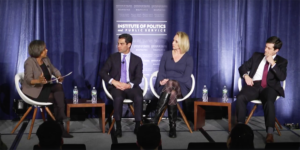Collaboration between local leaders across the United States is crucial to addressing both local and national challenges, Mayors Francis Suarez (R) of Miami, Fla., Pete Buttigieg (D) of South Bend, Ind., and Lydia Mihalik (R) of Findlay, Ohio, said Tuesday night at an event cosponsored by the Georgetown Institute of Politics and Public Service, the Georgetown Global Cities Initiative and the United States Conference of Mayors.
The event was moderated by Sheila Foster, a professor of law and public policy at the Georgetown University Law Center.
The event, which served as the GGCI’s first public offering, provided a forum for local officials to address their leadership in the face of the federal gridlock. Topics ranged from climate change resiliency and regionalism to the importance of cross-national governmental collaboration.
Suarez, who took office in November, said that local mayors can often be more effective than government at the state and federal levels dominated by party politics.

“We [mayors] look at the world as problem, solution,” Suarez said. “We don’t look at the world through a partisan lens.”
This pragmatic policymaking has allowed Miami to combat climate change by adopting resiliency efforts, Suarez added. To prevent flooding from rising seas, Miami officials promised last year to spend about $200 million on improved storm drainage systems, seawalls and flood pumps, according to the Miami Herald.
Buttigieg, who was elected in 2012 at the age of 29 as America’s youngest mayor of a city with about 100,000 people, offered regionalism as a solution to govern U.S. cities and towns.
“What we found is that we rise and fall as a region, and rather than try to all fight each other for our little parochial interests, what we really need to do is make sure that the region as a whole is better off,” Buttigieg said.
The South Bend mayor, who was a candidate for the Democratic National Committee chairmanship in February 2017, emphasized regionalism as a way for the United States to remain economically competitive against China.
“At a time when there are obscure, minor cities of 5 to 10 million in China, the idea that our big competition is from a nearby rural county just is no longer keeping up with the times,” Buttigieg said.
Mihalik, who became the first female mayor of Findlay upon her election in 2012, also emphasized the importance of collaboration. She promoted idea-sharing between local governments, touting the United States Conference of Mayors as a good example of collaboration.
“Mayors are really good at sharing passionately and stealing shamelessly,” Mihalik said, attributing her paraphrase to a common saying among mayors.
Tom Cochran, CEO and executive director of the USCM, said he was optimistic about the prospects for the United States under the mayors’ leadership.
“I’ve never had so much hope in America as I’ve had with this new crop of mayors that we have elected,” Cochran said. “I believe that if you are students of public service, look at the cities, look at the local level, and watch these mayors. You are looking at the future of America.”
Mo Elleithee (SFS ’94), GU Politics executive director, is also optimistic about the future of politics, describing Suarez, Mihalik and Buttigieg as good examples for young people as they pursue leadership and public service roles in their communities.
“Too often in politics, I think that people are under the impression that they have to wait for their turn before they can be elevated to positions of leadership,” Elleithee said. “Well, here are three young people who seized an opportunity to make change in their local communities and are doing it every day, putting partisanship aside to just get things done.”
Kathryn Blanco (COL ’21) said the event inspired her to continue to explore the processes of local government.
“I liked seeing how politics, or not even so much politics as governance, works on a local level, because it’s not something you hear about a lot on the news,” Blanco said. “It’s something I want to learn more about.”




















